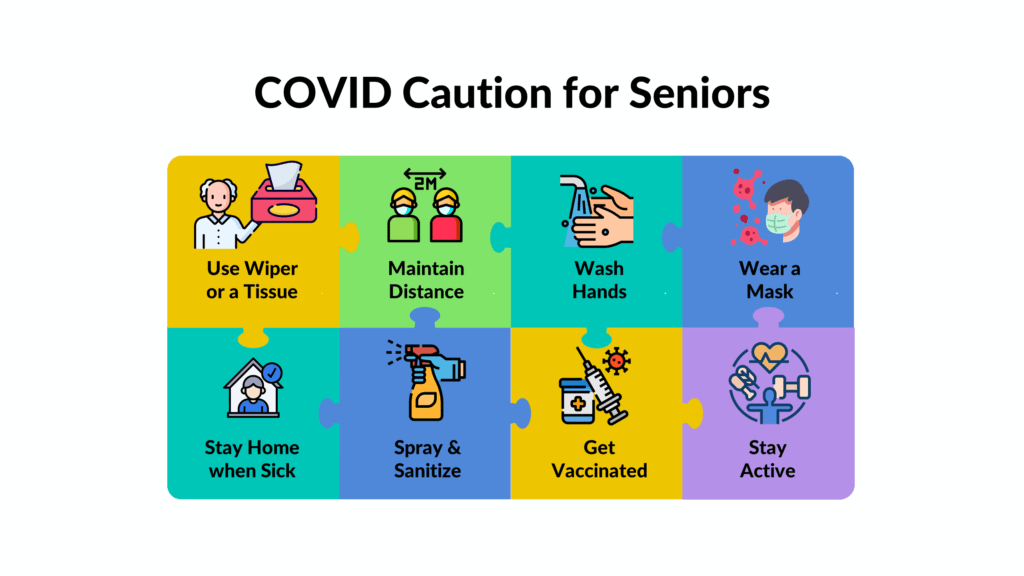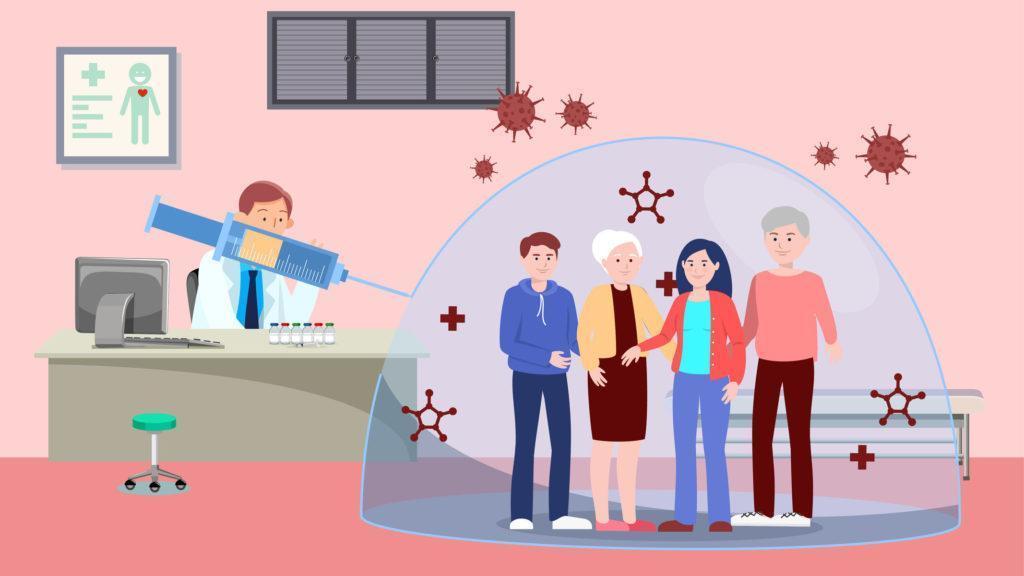Article Contents
Introduction
Now that COVID Vaccination for Seniors are available, you can easily get immune from the deadly virus. But, unfortunately, there is much misinformation concerning vaccines on social media.
It’s crucial to note that there are valid reasons for seniors to receive vaccinations. The risk of severe sickness from COVID-19 increases with age, according to the US Centers for Disease Control and Prevention. As a result, the elderly are the most vulnerable although 65.1 percent of COVID-19 cases were in adults under 49. Yet, 95.3 percent of deaths were in people 50 and over.
As you can imagine, not getting the Covid-19 vaccination can have quite an impact on the quality of your life.
COVID Vaccination for Seniors: Things to Know
Pfizer and Moderna are the two primary vaccines now available. Both vaccines were shown to be 94 percent to 95 percent effective in drug trials, according to Kaiser Health News. These are administered in 2 doses in three to four weeks intervals. And recently, we have the booster dose here as well to fight the latest Covid-19 variance.
There are quite a few things you might want to know about vaccines. This includes why you should be vaccinated and why some of the things you’ve been hearing are wrong.

Some Key Facts about the COVID Vaccines
Both Pfizer and Moderna have made 50 million doses available in January. Then, in February and March, 60 million dosages were administered. This amount is enough to treat 85 million people. So, there should be enough COVID vaccines for seniors and other at-risk individuals.
Pfizer aims to have 1.3 billion doses accessible for the entire year, according to WebMD. Moderna estimates that 80 million doses will be distributed. One of the most significant problems in the distribution of vaccinations will be storage and temperature.
The Pfizer vaccine must be preserved at minus 70 degrees Celsius. The vaccination from Moderna requires longer preservation at minus 20 degrees Celsius.
Another critical challenge is actually to get the vaccine. Healthcare facilities and hospitals are distributing COVID vaccines for seniors, according to AARP. You will have more opportunities to get the vaccine when the shipping amount is increased.
COVID Vaccination for Seniors: the Misconceptions
There are many misconceptions concerning COVID immunizations for elders and others. Everything from their rapid development to what’s within them is a source of suspicion. Unfortunately, it’s possible that these beliefs are stopping people from getting COVID vaccines.
Here are some of the most frequent COVID vaccine myths and their truth.
1. Rapid development and testing
The development of COVID vaccines happened quickly due to two factors. They are:
1. the nature of the pandemic, and
2. the deployment of new technology
Pharmaceutical companies were compelled to provide a quick remedy due to the pandemic’s nature. The US government also placed a high priority on finding a vaccination as soon as possible. Thus, Operation Warp Speed was used to help speed up development. It was able to maintain safety and efficacy criteria as a result of this.
The vaccines use a new technology called mRNA, or messenger RNA. Although this might be the first time this method has been applied in a public vaccine, researchers have already been studying it for years.
2. People will get COVID even after vaccination
Your immune system will be able to recognize and fight disease thanks to these vaccines. And the promising part is that you will have no infectious side effects.
The vaccines introduce mRNA into your cells. This instructs them to make a piece of the protein present in the COVID-19 virus. These protein fragments cause your immune response to develop a virus-fighting reaction. Yet, they don’t harm your body.
3. What’s inside the vaccines?
Both the Pfizer and Moderna vaccines have ingredient lists available. Both vaccines use lipids, or fats, to transfer mRNA into cells in addition to mRNA. In addition, there are a few more common elements that aid in the vaccine’s stability. According to social media conspiracy theories, they include microchips or tracking devices. We’re happy to let you know that they don’t.
4. Will vaccines alter our DNA?
The vaccines use mRNA to initiate an immune response to the COVID-19 virus. Once the mRNA has accomplished this, the body’s cells will break it down and eliminate it.
5. Already affected people do not need vaccination
There isn’t enough data to say whether or not someone will get COVID-19 again. We can refer this as “natural immunity”. But, some studies suggest that spontaneous COVID-19 immunity may not remain long.
Experts advise that it is appropriate to be vaccinated even if you’ve had COVID-19. So, if you’ve already had the virus and are wondering about getting vaccinated, then you should do it. After all, COVID vaccines for seniors have been proven to be far more beneficial. Besides, even if you’ve had the virus, the chances are that you don’t want it again.
6. The Vaccines Cause Severe Side Effects
There have been reports of short-term, mild, or moderate reactions. But, they go away without injury and other complications. Fever, chills, headache, fatigue, and muscle pain have been reported too. These COVID vaccine side effects actually indicate that your immune system is responding. They are common when receiving vaccines of all kinds, so don’t worry!
7. Mask is unnecessary after vaccination
Everyone who seeks a COVID Vaccination for Seniors may have to wait a while. This is because you are not immediately immune after receiving your first shot. Additionally, immunization may protect you from becoming ill. However, it is unknown if you can still carry the infection and pass it on to others. Thus, precautions must be taken until more about how well the vaccination works.
8. The infected can get better naturally, without vaccines
The majority of patients who were infected with COVID-19 recovered after the vaccination. However, it is also true that the virus has killed approximately 2 million individuals globally. Also, other health issues may arise as a result of the disease’s ability to harm the lungs, heart, and brain. Experts are still trying to figure out what these things are.
The vaccine also protects individuals in your immediate vicinity. Many people has spread the virus even after the vaccination. Vaccination protects everyone, particularly those who are most vulnerable. It will be critical in the fight against the epidemic.
9. The microchip in the vaccines will track people
The vaccine does not contain a microchip. Thus, it will not track individuals or collect personal information for storage in a database.
10. Did researchers use fetal tissues to develop vaccines?
Not at all. Inventors did not use fetal tissues to develop the important COVID vaccines.
Why Are People Living in Senior Communities More at Risk?
The high fatality rate of COVID-19 has been one of the scariest aspects of the virus. People in nursing homes and long-term care facilities are particularly vulnerable. This is due to three factors.
The first is that the patients in nursing homes have serious or complex medical illnesses. This weakens their immune systems and places them at higher risk of infection.
The second is that COVID-19 can spread in a confined community like nursing homes.
Finally, many of the people in these facilities have Alzheimer’s disease or dementia connected to it. As a result, they may have difficulty recognizing that they are ill or telling someone that they don’t feel well. The distribution of COVID vaccines must happen across nursing homes to eliminate this danger.
Do You Still Not Want to Get the COVID Vaccine?
If a person is of sound mind, they have the freedom to refuse medical treatment in the United States. Dementia affects many nursing home residents. They may be unable to comprehend the risks and benefits of the treatment they are receiving. If someone in a nursing home refused a vaccine, we’d make sure they’re capable of making their own medical decisions first.
Specifically, a patient must understand the pros and cons associated with Covid-19 vaccinations.
If they do, then they have the right to refuse COVID vaccines for seniors. If they can’t make their own medical decisions, we turn to a designated surrogate decision-maker.
Individual state laws define who the decision-maker is if the patient has not designated a health care proxy. In most states, this is a relative or close relative. If there are no relatives, we will appoint a court-appointed guardian.
Importance of COVID Vaccination for Seniors
The seniors around us are more at risk of Covid-19 complications. This is why CDC recommends that adults 65 years and older receive COVID-19 vaccines. And an essential step in preventing further infection is the Covid-19 vaccination.
COVID-19 vaccines are effective at helping protect against severe disease and death. This includes variants of the virus that are currently circulating, including the Delta variant.
After vaccination, you can even resume many pre-pandemic activities. If you are in a location with significant or high transmission, you should wear a mask indoors in public. This is to ensure maximum protection from the Delta variant and prevent it from spreading to others. As a result of the immunization, you may have side effects. These are relatively frequent and typically fade away in a few days. Infections affect just a small percentage of completely immunized people.
When these diseases strike vaccinated people, they are usually minor. But, you may be able to contaminate the virus to others if you get the vaccine and then the Delta form infects you. Even if adequately vaccination, people with compromised immune systems may not be protected.
Conclusion
In the end, experts strongly recommend that you get the vaccine. Researchers have proven that COVID-19 has more severe and fatal impacts on older people. So you must get the COVID Vaccination for Seniors as soon as you can. Then, all you need to do is dial 911, and the operator can easily get you towards the closest COVID vaccine center near you.

